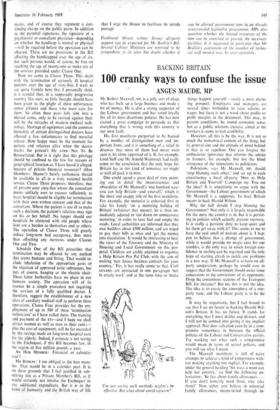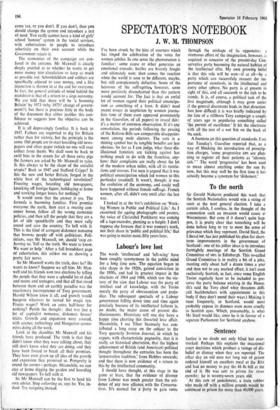100 cranky ways to confuse the issue
BACKING BRITAIN ANGUS MAUDE, MP
Mr Robert Maxwell, MP, is a jolly sort of chap, who has built up a large business and made a lot of money. He is also a strong supporter of the Labour government and has voted loyally for all its most disastrous policies. He has now started a great campaign to persuade us that everything that is wrong with this country is our own fault.
His first manifesto purported to be backed by a number of distinguished men and im- portant firms, and it is something of a relief to discover that most of them had never even seen it, let alone approved of it. If, for example. Lord Sieff and Mr Arnold Weinstock had really come to the conclusion that the only hope for Britain lay in this kind of nonsense, we might as well all pack it in now.
One could spend a great deal of time point- ing out in detail the inconsistencies and absurdities of Mr Maxwell's 'one hundred ways you can help Britain—and yourself,' which is the short and snappy title of the first manifesto. For example, the motorist is exhorted first to take his family 'on a motoring holiday of Britain' (whatever that means); he is then im- mediately adjured to 'cut down on unnecessary motoring; in order to save fuel and empty the roads. Local authorities are informed that they owe builders about £500 million, and are urged to pay their bills at once and 'get the money into circulation.' It would be interesting to hear the views of the Treasury and the Ministry of Housing and Local Government on this pro- posal. Children are archly enjoined to organise a Help Britain Pen Pal Club, with the aim of making 'new future business contacts for your country.' Yes, it has really come to that. Civil servants are instructed in one paragraph 'not to create work' and at the same time to 'make
'I'm not saying such methods mightn't be effective. But what about world opinion?'
things happen yourself —surely a most alarm- ing prospect. Employers and managers arc several times forbidden to raise salaries or wages, but there is not a word about profits or profit margins in the document. This may, in present conditions, be sound economic sense, but as a public relations exercise aimed at the workers it seems to lack credibility.
However, all this is by the way. It is not so much the nonsensical content of the thing, but its general aim and the attitude of mind behind it that is so repellent. One can forgive the enthusiastic ignorance that informs the advice to farmers, for example, but not the blind arrogance of the injunctions to politicians.
Politicians, says Mr Maxwell, MP, should 'stop blaming each other,' and set up in each constituency a local all-party 'How to Help Britain and Yourself' Campaign Ho. You See the idea? It is unpatriotic to argue with the Government—the Labour government of which Mr Maxwell is a supporter. To back Britain means to back Harold Wilson.
Why the hell should I stop blaming the Government? Not only is it largely responsible for the mess the country is in, but it is persist- ing in policies which actually prevent recovery. Is it really a patriotic duty to keep quiet and let them get away with it? This seems to me to have the real smell of nazism about it. I hap- pen to believe that a change of government, while it would provide no magic cure for our troubles, is the only way in which foreign con- fidence in sterling can be regained and the only hope of starting afresh to tackle our problems in a new way. If Mr Maxwell is so keen on all- party cooperation, perhaps he would care to suggest that the Government should make some concessions to the convictions of its opponents. Drop the contentious sections of the Transport Bill, for instance? But no, this is not the idea. The idea is to create the atmosphere of a one- party state, and the Labour party is to be the one.
It may be unpatriotic, but I feel bound to say that I see no future in backing Harold Wil- son's Britain. It has no future. It stands for everything that I most dislike and distrust, and I will not be conned into giving it my implicit approval. Nor does salvation even lie in a com- promise somewhere in between the official policies of the Labour and Conservative parties. Try working out what such a compromise would mean in terms of actual policies, and you will see what I mean.
The Maxwell manifesto is full of naive attempts to achieve a kind of compromise with- out making anything too explicit. For example, under the general heading 'Six ways a mum can help her country,' we find the following ex- hortation: 'Be fair about family allowances.... If you don't honestly need them, why take them?' Now either you believe in universal family allowances, means-tested through in- come tax, or you don't. If you don't, then you should change the system and introduce a test of need. You really cannot have a kind of girls' school 'honour' system in the social services, with exhortations to people to introduce selectivity on their own account while the Government rejects it.
The economics of the campaign are con- fused in the extreme. Mr Maxwell is clearly deeply puzzled as to whether he wants to get more money into circulation or keep as much as possible out. Schoolchildren and soldiers are specifically adjured to save money, and a like injunction is thrown in at the end for everyone. In fact, the general attitude of mind behind the manifesto is that of a return to a siege economy. We are told that there will be 'a booming Britain' by 1973 (why 1973? change of govern- ment?), but there is precious little in the body of the document that either justifies this con- fidence or suggests how the objective can be achieved.
It is all depressingly familiar. It is back to 1947. Fathers are requested to dig for Britain rather than for victory, but the principle is the same. Old people are to start hoarding old news- papers and silver paper (which no one will ever collect from them). We shalt soon be back to swill bins in the streets for all those extra pigs the farmers are asked by Mr Maxwell to raise. Is this always to be the shape of the socialist utopia? Back to 1947 and Stafford Cripps? Is this the new and better Britain, forged in the white heat of the technological revolution? Freezing wages, hoarding old newspapers, knocking off foreign liquor, holidaying at home and working longer hours for nothing?
It would seem that the answer is yes. The formula is becoming familiar. First promise everyone, the earth, then start a roaring con- sumer boom, follow all the wrong economic policies, and then tell the people that they are a lot of idle spendthrifts and they must rally round and save the country. To hell with it. This is the kind of arrogant dishonest nonsense that browns people off with politicians. Poli- ticians, says Mr Maxwell, MP, should 'stop ex- horting us. Tell us the truth. We want to know. We want to help.' After a full broadsheet page of exhortation, this strikes me as showing a pretty fair nerve.
So Mr Maxwell wants the truth, does he? He wants to know? Suppose we tell him. Mr Max- well and his friends won two elections by telling the people that they were a splendid lot of dads and mums and teenagers, and that all that stood between them and an earthly paradise was the reactionary incompetence of Tory government. Harold Wilson knew it all, and growth would burgeon wherever he turned his magic eye. Freeze wages? Work an extra half-hour for nothing? Perish the thought : that was just a lot of capitalist nonsense, dishonest bosses' tricks. Growth and expansion were assured, with science, technology and Hungarian econo- mists doing all the work.
Look at the shambles Mr Maxwell and his friends have produced. The truth is that they didn't know what they were talking about, they still don't know what they are doing, and they have been forced to break all their promises. They have even given up all idea of the growth and expansion they promised us. Prosperity is round the corner—perhaps. Meanwhile, we can stay at home digging the garden and hoarding old newspapers. To hell with it
• So Mr Maxwell can be the first to heed his own advice. Stop exhorting us, says he. Yes, in- deed. Try resigning instead.



































 Previous page
Previous page